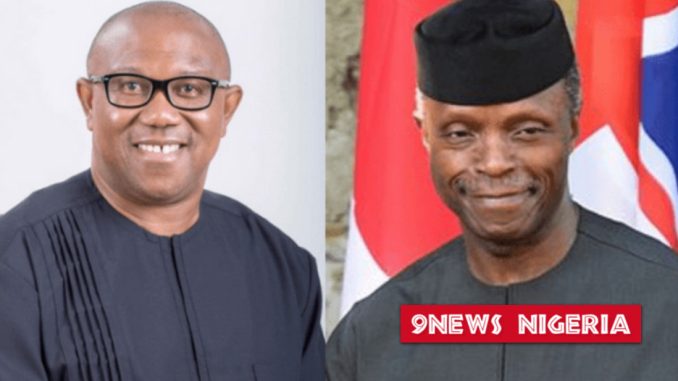
The duo of Vice President Yemi Osinbajo of the All Progressives Congress (APC) and former Anambra State governor, Peter Obi, of the Peoples Democratic Party (PDP) have both emerged as the most preferred presidential aspirants in the general elections scheduled for February 2023, 9news Nigeria gathered.
The result was drawn from a survey conducted by NexTier, a multi-competency advisory firm, and Data-Tier, a data analytics and digital communications firm, released, yesterday, by Dr. Ndubuisi Nwokolo, Partner and Research Lead, NexTier.
The survey aimed to gauge Nigerians’ preferences for a presidential candidate, understand the challenges they would like the next government to address promptly, and decode how ethnic and gender biases would inform the next election.
Judged across all 467 responses, the most preferred candidate for president were Peter Obi (46 per cent), Yemi Osinbajo (28 per cent), Bola Tinubu (7.5 per cent) and Atiku Abubakar (3 per cent).
The most preferred candidates for the vice presidency were Aminu Tambuwal (28 per cent), Musa Kwankwaso (19 per cent), Peter Obi (16 per cent), Bukola Saraki (6.9 per cent), Nyesom Wike (6.4 per cent) and Yemi Osinbajo (5.8 per cent).
Assessing the responses from a geopolitical dimension, the presidential preference for respondents from southern Nigeria were Peter Obi (51.2 per cent) and Yemi Osinbajo (26.6 per cent).
For the position of vice president, these same respondents preferred Aminu Tambuwal (30.2 per cent), Peter Obi (16.6 per cent) and Musa Kwankwaso (16.6 per cent).
No other candidates polled up to 10 per cent in either of the categories.
The presidential preferences for respondents from northern Nigeria were Yemi Osinbajo (34.2 per cent), Peter Obi (20 per cent), and Musa Kwankwaso (13.2 per cent).
The respondents’ preferences for the vice presidency were Musa Kwankwaso (32.9 per cent), Aminu Tambuwal (17.1 per cent) and Peter Obi (14.4 per cent).
No other candidates polled up to 10 per cent in either of the categories.
The survey asked the respondent to rank the 15 candidates in their Most Preferred and Least Preferred order. Peter Obi and Yemi Osinbajo were the most preferred candidates, while Bola Tinubu and Abubakar Malami were the least preferred.
Analysis of the survey responses shows that Nigerians are most concerned with the insecurity level in the country. Three out of 10 Nigerians (34.1 per cent) indicated that insecurity is the most critical challenge in the country. Weak economic growth ranked second (22.1 per cent), while national disunity ranked third (13.92 per cent). Poverty (11.99 per cent) and unemployment (10.28) were the other critical development issues. The ordering of the developmental challenges remained relatively the same when analysed from a geopolitical perspective.
Respondents were asked to select the top three attributes (out of a list of 10) they wished to see in their next president. The survey showed that despite Nigeria’s overt religiosity, “Believes in God” ranks very low compared to
“competence,” which is represented on this list by terms such as knowledgeable (17.9 per cent), ability to solve problems (17.4 per cent), and capable (16.5 per cent). Being “young” received only 3.2 per cent of the responses.
How much influence do ethnicity and religion have on the choice of presidential candidates in Nigeria? Would Nigerians vote for a president/vice-president ticket that meets all their desirable attributes, but both candidates share the same religion or same ethnic origins? On religion, while 5.14 per cent of the respondents are emphatic that they would never vote for such a ticket, 58. 7 per cent are open to the idea.
Similarly, on ethnicity, 11.13 per cent of respondents are emphatic that they would never vote for a ticket where the presidential and vice-presidential candidates are from the same ethnic group. However, 43.7 per cent of respondents are open to the idea.
Is Nigeria set for a female president, following Liberia and Malawi’s footsteps? The survey responses are in the affirmative, with over 86 per cent of respondents stating they would vote for a competent woman.
The most gender-progressive regions in Nigeria are the South-South and North Central. 93.4 per cent of respondents in the South-South would vote for a competent female president, while 97.1 per cent would do the same in the North Central region. The least progressive regions are the North West with 57.7 per cent and the North East with 64.3 per cent. It is, however, unclear how this perception would play out at the polls.
This survey is a dipstick analysis that provides insights into Nigeria’s evolving political space. Given the long electoral process leading to the February 2023 elections, one can expect significant changes in perception in the intervening months.
NexTier and Data-Tier will continue to run these surveys until Nigerians go to the polls to elect their new president and vice president.
9news Nigeria